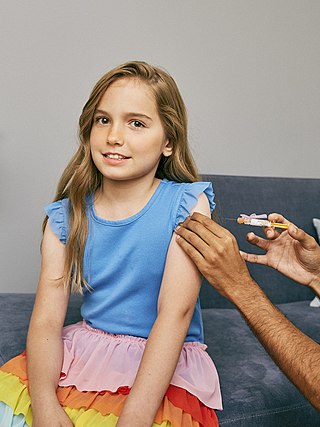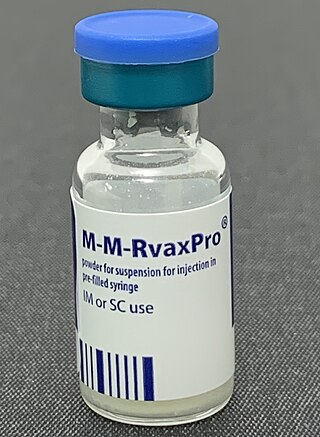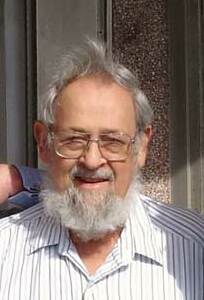Related Research Articles

Vaccination is the administration of a vaccine to help the immune system develop immunity from a disease. Vaccines contain a microorganism or virus in a weakened, live or killed state, or proteins or toxins from the organism. In stimulating the body's adaptive immunity, they help prevent sickness from an infectious disease. When a sufficiently large percentage of a population has been vaccinated, herd immunity results. Herd immunity protects those who may be immunocompromised and cannot get a vaccine because even a weakened version would harm them. The effectiveness of vaccination has been widely studied and verified. Vaccination is the most effective method of preventing infectious diseases; widespread immunity due to vaccination is largely responsible for the worldwide eradication of smallpox and the elimination of diseases such as polio and tetanus from much of the world. However, some diseases, such as measles outbreaks in America, have seen rising cases due to relatively low vaccination rates in the 2010s – attributed, in part, to vaccine hesitancy. According to the World Health Organization, vaccination prevents 3.5–5 million deaths per year.

The MMR vaccine is a vaccine against measles, mumps, and rubella, abbreviated as MMR. The first dose is generally given to children around 9 months to 15 months of age, with a second dose at 15 months to 6 years of age, with at least four weeks between the doses. After two doses, 97% of people are protected against measles, 88% against mumps, and at least 97% against rubella. The vaccine is also recommended for those who do not have evidence of immunity, those with well-controlled HIV/AIDS, and within 72 hours of exposure to measles among those who are incompletely immunized. It is given by injection.

Thiomersal (INN), or thimerosal, also sold under the name merthiolate is an organomercury compound. It is a well-established antiseptic and antifungal agent.

Vaccine hesitancy is a delay in acceptance, or refusal, of vaccines despite the availability of vaccine services and supporting evidence. The term covers refusals to vaccinate, delaying vaccines, accepting vaccines but remaining uncertain about their use, or using certain vaccines but not others. Although adverse effects associated with vaccines are occasionally observed, the scientific consensus that vaccines are generally safe and effective is overwhelming. Vaccine hesitancy often results in disease outbreaks and deaths from vaccine-preventable diseases. Therefore, the World Health Organization characterizes vaccine hesitancy as one of the top ten global health threats.
The Vaccine Adverse Event Reporting System (VAERS) is a United States program for vaccine safety, co-managed by the U.S. Centers for Disease Control and Prevention (CDC) and the Food and Drug Administration (FDA). VAERS is a postmarketing surveillance program, collecting information about adverse events that occur after administration of vaccines to ascertain whether the risk–benefit ratio is high enough to justify continued use of any particular vaccine.

Bernard Rimland was an American research psychologist, writer, lecturer, and influential person in the field of developmental disorders. Rimland's first book, Infantile Autism, sparked by the birth of a son who had autism, was instrumental in changing attitudes toward the disorder. Rimland founded and directed two advocacy groups: the Autism Society of America (ASA) and the Autism Research Institute. He promoted several since disproven theories about the causes and treatment of autism, including vaccine denial, facilitated communication, chelation therapy, and false claims of a link between secretin and autism. He also supported the ethically controversial practice of using aversives on autistic children.
The 2000 Simpsonwood CDC conference was a two-day meeting convened in June 2000 by the Centers for Disease Control and Prevention (CDC), held at the Simpsonwood Methodist retreat and conference center in Norcross, Georgia. The key event at the conference was the presentation of data from the Vaccine Safety Datalink examining the possibility of a link between the mercury compound thimerosol in vaccines and neurological problems in children who had received those vaccines.
The Vaccine Safety Datalink Project (VSD) was established in 1990 by the United States Centers for Disease Control and Prevention (CDC) to study the adverse effects of vaccines.
The thiomersal vaccine controversy centers around public concerns and debates over the safety of thiomersal, a mercury-based preservative used in vaccines, with some fearing it could cause neurological disorders such as autism, despite extensive scientific research showing no credible evidence linking thiomersal to such conditions.
A vaccine adverse event (VAE), sometimes referred to as a vaccine injury, is an adverse event believed to have been caused by vaccination. The World Health Organization (WHO) knows VAEs as Adverse Events Following Immunization (AEFI).
Neal A. Halsey is an American pediatrician, with sub-specialty training in infectious diseases, international health and epidemiology. Halsey is a professor emeritus of international health and director emeritus of the Institute for Vaccine Safety at the Johns Hopkins Bloomberg School of Public Health, in Baltimore, Maryland. He had a joint appointment in the Department of Pediatrics at the Johns Hopkins School of Medicine and serves as co-director of the Center for Disease Studies and Control in Guatemala.

The Office of Special Masters of the U.S. Court of Federal Claims, popularly known as "vaccine court", administers a no-fault system for litigating vaccine injury claims. These claims against vaccine manufacturers cannot normally be filed in state or federal civil courts, but instead must be heard in the U.S. Court of Federal Claims, sitting without a jury.
Claims of a link between the MMR vaccine and autism have been extensively investigated and found to be false. The link was first suggested in the early 1990s and came to public notice largely as a result of the 1998 Lancet MMR autism fraud, characterised as "perhaps the most damaging medical hoax of the last 100 years". The fraudulent research paper, authored by Andrew Wakefield and published in The Lancet, falsely claimed the vaccine was linked to colitis and autism spectrum disorders. The paper was retracted in 2010 but is still cited by anti-vaccine activists.
The rotavirus vaccine is a vaccine used to protect against rotavirus infections, which are the leading cause of severe diarrhea among young children. The vaccines prevent 15–34% of severe diarrhea in the developing world and 37–96% of the risk of death among young children due to severe diarrhea. Immunizing babies decreases rates of disease among older people and those who have not been immunized.
John Barthelow Classen is an American immunologist and opponent of vaccination. He received his M.D. from the University of Maryland, Baltimore in 1988, his M.B.A. from Columbia University in 1992 and obtained his medical license in October 1997. He is best known for publishing research concluding that vaccines, in particular the Hib vaccine, cause insulin-dependent diabetes mellitus, a hypothesis he proposed based on experiments he conducted on mice in 1996. His views are disputed and considered unverified.
In the United States, an alternative vaccination schedule is a vaccination schedule differing from the schedule endorsed by the Advisory Committee on Immunization Practices (ACIP). These schedules may be either written or ad hoc, and have not been tested for their safety or efficacy. Proponents of such schedules aim to reduce the risk of adverse effects they believe to be caused by vaccine components, such as "immune system overload" that is argued to be caused by exposure to multiple antigens. Parents who adopt these schedules tend to do so because they are concerned about the potential risks of vaccination, rather than because they are unaware of the significance of vaccination's benefits. Delayed vaccination schedules have been shown to lead to an increase in breakthrough infections without any benefit in lower side effect profiles.
Extensive investigation into vaccines and autism has shown that there is no relationship between the two, causal or otherwise, and that vaccine ingredients do not cause autism. Vaccinologist Peter Hotez researched the growth of the false claim and concluded that its spread originated with Andrew Wakefield's fraudulent 1998 paper, with no prior paper supporting a link.

Vaccination policy of the United States is the subset of U.S. federal health policy that deals with immunization against infectious disease. It is decided at various levels of the government, including the individual states. This policy has been developed over the approximately two centuries since the invention of vaccination with the purpose of eradicating disease from the U.S. population, or creating a herd immunity. Policies intended to encourage vaccination impact numerous areas of law, including regulation of vaccine safety, funding of vaccination programs, vaccine mandates, adverse event reporting requirements, and compensation for injuries asserted to be associated with vaccination.
Trudy Virginia Noller Murphy is an American pediatric infectious diseases physician, public health epidemiologist and vaccinologist. During the 1980s and 1990s, she conducted research at Southwestern Medical School in Dallas, Texas on three bacterial pathogens: Haemophilus influenzae type b (Hib), Streptococcus pneumoniae (pneumococcus), and methicillin-resistant Staphylococcus aureus (MRSA). Murphy's studies advanced understanding of how these organisms spread within communities, particularly among children attending day care centers. Her seminal work on Hib vaccines elucidated the effects of introduction of new Hib vaccines on both bacterial carriage and control of invasive Hib disease. Murphy subsequently joined the National Immunization Program at the Centers for Disease Control and Prevention (CDC) where she led multi-disciplinary teams in the Divisions of Epidemiology and Surveillance and The Viral Hepatitis Division. Among her most influential work at CDC was on Rotashield™, which was a newly licensed vaccine designed to prevent severe diarrheal disease caused by rotavirus. Murphy and her colleagues uncovered that the vaccine increased the risk of acute bowel obstruction (intussusception). This finding prompted suspension of the national recommendation to vaccinate children with Rotashield, and led the manufacturer to withdraw the vaccine from the market. For this work Murphy received the United States Department of Health and Human Services Secretary's Award for Distinguished Service in 2000, and the publication describing this work was recognized in 2002 by the Charles C. Shepard Science Award from the Centers for Disease Control and Prevention.
References
- ↑ "Frank DeStefano MD MPH". WebMD . Retrieved 14 August 2013.
- ↑ "The Risk of Autism Is Not Increased by "Too Many Vaccines Too Soon"". Journal of Pediatrics. 29 March 2013. Retrieved 14 August 2013.
- ↑ "Vaccine-autism connection debunked again". CNN . 29 March 2013. Archived from the original on April 1, 2013. Retrieved 11 September 2013.
- ↑ Trotter, J. K. (29 March 2013). "Nope, Vaccinations Don't Cause Autism". The Atlantic Wire . Retrieved 11 September 2013.
- ↑ Hamilton, Jon (29 March 2013). "Number Of Early Childhood Vaccines Not Linked To Autism". NPR.org . NPR . Retrieved 11 September 2013.
- ↑ Verstraeten, Thomas (November 2003). "Safety of Thimerosal-Containing Vaccines: A Two-Phased Study of Computerized Health Maintenance Organization Databases". Pediatrics. 112 (5): 1039–1048. doi:10.1542/peds.112.2.e98. PMID 14595043.
- ↑ Thompson, W. W.; Price, C.; Goodson, B.; Shay, D. K.; Benson, P.; Hinrichsen, V. L.; Lewis, E.; Eriksen, E.; Ray, P.; Marcy, S. M.; Dunn, J.; Jackson, L. A.; Lieu, T. A.; Black, S.; Stewart, G.; Weintraub, E. S.; Davis, R. L.; Destefano, F.; Vaccine Safety Datalink, T. (2007). "Early Thimerosal Exposure and Neuropsychological Outcomes at 7 to 10 Years". New England Journal of Medicine. 357 (13): 1281–1292. doi: 10.1056/NEJMoa071434 . PMID 17898097.
- ↑ Haber, P.; Destefano, F.; Angulo, F. J.; Iskander, J.; Shadomy, S. V.; Weintraub, E.; Chen, R. T. (2004). "Guillain–Barré Syndrome Following Influenza Vaccination". JAMA. 292 (20): 2478–2481. doi:10.1001/jama.292.20.2478. PMID 15562126.
- ↑ Barlow, W. E.; Davis, R. L.; Glasser, J. W.; Rhodes, P. H.; Thompson, R. S.; Mullooly, J. P.; Black, S. B.; Shinefield, H. R.; Ward, J. I.; Marcy, S. M.; Destefano, F.; Chen, V.; Immanuel, J. A.; Pearson, C. M.; Vadheim, V.; Rebolledo, D.; Christakis, P. J.; Benson, N.; Lewis, R. T.; Centers for Disease Control Prevention Vaccine Safety Datalink Working Group (2001). "The Risk of Seizures after Receipt of Whole-Cell Pertussis or Measles, Mumps, and Rubella Vaccine". New England Journal of Medicine. 345 (9): 656–661. doi: 10.1056/NEJMoa003077 . PMID 11547719.
- ↑ Destefano, F.; Vaccine Safety Datalink Research Group (2001). "The Vaccine Safety Datalink project". Pharmacoepidemiology and Drug Safety. 10 (5): 403–406. doi:10.1002/pds.613. PMID 11802585. S2CID 20854409.
- ↑ Ory, H. W.; Rubin, G. L.; Jones, V.; et al. (1984). "Mortality among young black women using contraceptives". JAMA: The Journal of the American Medical Association. 251 (8): 1044–1048. doi:10.1001/jama.1984.03340320030022. PMID 6229648.
- ↑ "NCIRD Milestones". National Center for Immunization and Respiratory Diseases. September 2006. Archived from the original on 2013-08-15. Retrieved 15 August 2013.